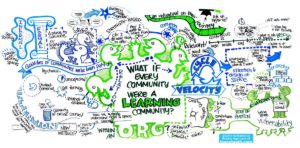 I have a confession to make. I have been struggling lately, well actually for a few years. Struggling with making the time for original thought. You know, true creative genius. The type of thinking that comes from being well read (so as to be able to contrast and compare ideas), having wildly different kinds of experiences (that provide alternate ways of looking at common issues and problems), thick schema, stimulating conversation and making time to talk about things that are hard and messy with people whose belief system is different from my own. Making time to have spirited debates without loss of self control, and then digging in deep with reflection with note taking and conceptual frame making. You know, scholarship.
I have a confession to make. I have been struggling lately, well actually for a few years. Struggling with making the time for original thought. You know, true creative genius. The type of thinking that comes from being well read (so as to be able to contrast and compare ideas), having wildly different kinds of experiences (that provide alternate ways of looking at common issues and problems), thick schema, stimulating conversation and making time to talk about things that are hard and messy with people whose belief system is different from my own. Making time to have spirited debates without loss of self control, and then digging in deep with reflection with note taking and conceptual frame making. You know, scholarship.
The Second Wave
I think my slipping away started when the second wave of learners came on the scene in my PLN and in my work at PLP. The first wave, the early adopters, provided such a creative place to learn. We all approached the shift with such a hunger. Collectively, we transparently shared (mostly through blog posts or long conversations over coffee) our ideas, reflections, experimentation, and failures. We connected. We collaborated. We grew. We grew both as individuals and collectively. None of us were here because we were voluntold, no, we wanted to be here. Wild horses 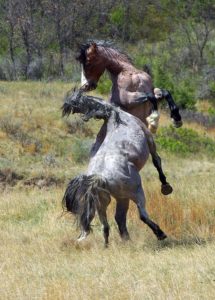 couldn’t have kept us away. And as a result we truly mastered the concepts and we solved the problems, or at least in our own minds. We could articulate clearly the collective intelligence we had built together. We knew the why of the what and eagerly shared and watched as others started playing with the how.
couldn’t have kept us away. And as a result we truly mastered the concepts and we solved the problems, or at least in our own minds. We could articulate clearly the collective intelligence we had built together. We knew the why of the what and eagerly shared and watched as others started playing with the how.
And then came the next wave of learners. At first, it seemed they were enthralled with our messages and a few (now thought leaders in the connected spaces) took the ideas and ran with them. They became the new “us” (the ones who were sharing transparently) on Twitter, which became the new blogs, and in 140 characters of cognitive bliss they began to teach us all.
And then things started to change.
Echos
I started to hear faint echos in the blogosphere and Twitterverse. It got worse. No new ideas. No original thought. Note: “Original” to me, one who had already traveled the path others were just starting on. And because more and more people were showing up on Twitter and other social media, it became common place to repeat the stories and concepts as a way to lay the foundation for the newbies. The cohorts coming to learn at PLP were required to participate, by the districts who signed them up. I remember thinking if it keeps going this way my epitaph is going to read, “She led them kicking and screaming into the 21st Century.”
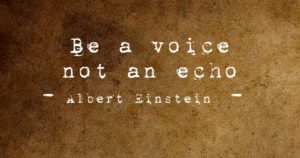 My perception was that everyone was sharing the why change message (while very few were implementing or experimenting with the ideas themselves.) Echos of the same phrases were being remixed in a variety of ways. I remember being asked to host hashtag chats and bringing the ideas I had been sharing for years (very little work on my part) and people were in awe as if they were just hearing about some of these concepts for the first time. (Maybe they were just being polite.) It seemed as if I didn’t have to share any new discovery- as so many still needed the basics. My eyes were glazing over as I was asked to speak over and over on the same message.
My perception was that everyone was sharing the why change message (while very few were implementing or experimenting with the ideas themselves.) Echos of the same phrases were being remixed in a variety of ways. I remember being asked to host hashtag chats and bringing the ideas I had been sharing for years (very little work on my part) and people were in awe as if they were just hearing about some of these concepts for the first time. (Maybe they were just being polite.) It seemed as if I didn’t have to share any new discovery- as so many still needed the basics. My eyes were glazing over as I was asked to speak over and over on the same message.
You’ve Seen It
You know what I mean right? You have seen this glazed look it in kids who have checked out in classrooms. The passion had left. I was bored. I had quit growing as a learner. I began to identify myself by what I was doing rather than who I was. And I was doing plenty. I said yes to everything just to have the distraction. The busier I became, the less time I had to reflect, read and think. It became a vicious cycle.
Desperate, I began to looking for other ways to get excited about the work; thinking maybe I needed to change careers or move or something. Always looking on the outside of myself for the answer. Finding that the more I tried to fit in with those I used to be so excited to dream and create with- the more I found I didn’t have anything in common with them anymore. 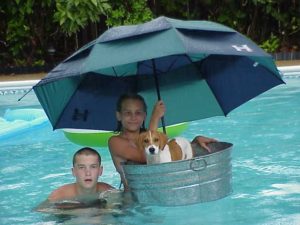 They were kind- but it was awkward. I always resorted to talking about my animals, a new featherless bird I had rescued, what I was learning about in medicine or from my kids – anything but more of the same with technology integration and tools. While I craved conversations about how technology was requiring different approaches to pedagogy or how to use technology to bring art and music back into democratic classrooms that embraced student agency, I rarely found them.
They were kind- but it was awkward. I always resorted to talking about my animals, a new featherless bird I had rescued, what I was learning about in medicine or from my kids – anything but more of the same with technology integration and tools. While I craved conversations about how technology was requiring different approaches to pedagogy or how to use technology to bring art and music back into democratic classrooms that embraced student agency, I rarely found them.
Starting to Climb Out
That’s when through my work at PLP we started to reinvent ourselves. In addition to other new initiatives, I started taking on enterprise level consulting gigs. Working with large national organizations, ministries of education in a variety of countries (including our own USDOE), departments of education at the state level, a few nonprofits, foundations and businesses I felt my passion returning. I was sharing, co-constructing and building collective intelligence as we (my team at PLP and I) worked hard at designing and implementing projects for others around digital transformation and student equity.
It all came to a head recently when I was asked to both facilitate at an executive summit and do a presentation at a conference in DC. The executive summit went really well. I thrive in an environment where I am pulling ideas and experiences from one group of thought leaders and then knitting them together in a little different way as a means of creating new schema in others who in turn remix them into ideas of their own and collaboratively co-construct something new. The feedback on the session was really positive. I left thinking– this is it. This is what is missing. This is where my talent and passion lies. While it certainly wasn’t the first time I had done this type of work and I almost always had great results, I wanted it to be *the* answer.
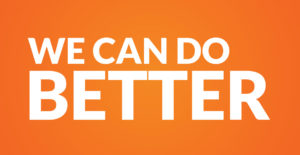 The presentation I was asked to give was another thing all together. I was presenting on something I have done literally 100s of times. I knew the audience would be a little different- a mix of business, higher ed, and a few K-12 educators sprinkled in – and that motivated me to do a little research, a little reworking of my content but basically giving the same presentation. Afterward, I felt ashamed. I knew I could have done better, so much better. The evaluations were acceptable, but inside a voice screamed – failure. I cried the entire drive home to Virginia Beach.
The presentation I was asked to give was another thing all together. I was presenting on something I have done literally 100s of times. I knew the audience would be a little different- a mix of business, higher ed, and a few K-12 educators sprinkled in – and that motivated me to do a little research, a little reworking of my content but basically giving the same presentation. Afterward, I felt ashamed. I knew I could have done better, so much better. The evaluations were acceptable, but inside a voice screamed – failure. I cried the entire drive home to Virginia Beach.
Facing the Reality that It Was Me
The next day I had a little talk with myself. I decided to up my game. To make the changes needed in my work, attitude, research, content and performance. I began to read every article that came across my Google Alerts and Twitter feeds. I researched the topics I would be leading and presenting on in an upcoming trip to Australia with a fervor. I made the time. I started asking those I respected in the field questions and actually listened to the answers and adjusted my constructs accordingly. I was getting excited about what I was learning. The more I read and took the time to think and sketch, the more passionate about the ideas I became. I started elaborating (cognitive psychology tells us elaboration allows for deep retention) to those outside of education to get their diverse reactions. It was magic. Their responses and resources only made me look deeper. It got to the point I couldn’t sleep I was so stimulated by what I was learning.
Passion Return
While in Australia and New Zealand (not my first visit to either place) my passion returned. I found as I listened, reflected 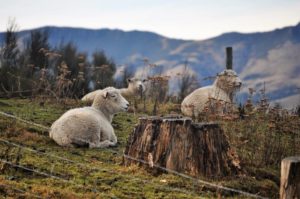 and took time to laugh- the new knowledge and what I had mastered before I left, started to connect! Also I made the time and effort to be with educators who are deep thinkers but to do so in a non-work environment. Funny how immersing yourself in a completely different setting, with people you do not know very well, can be just the creative jolt you need to bring back the passion and love for all you hold dear. My work in Australia and discussions in New Zealand took on a new zeal. My keynote was much better than anything I had done in a long time. I was very grateful.
and took time to laugh- the new knowledge and what I had mastered before I left, started to connect! Also I made the time and effort to be with educators who are deep thinkers but to do so in a non-work environment. Funny how immersing yourself in a completely different setting, with people you do not know very well, can be just the creative jolt you need to bring back the passion and love for all you hold dear. My work in Australia and discussions in New Zealand took on a new zeal. My keynote was much better than anything I had done in a long time. I was very grateful.
My cognitive heart realized a few things on this journey:
- Often the answer to positive change lies within an individual and not on the outside or in the circumstance.
- Learners, all learners, even those in our classrooms have to be vested in what they are learning. They need ownership.
- More advanced learners (advance in that they know the curriculum – not that they are gifted) will grow bored and detached if not challenged. Repetition can be lethal. It nurtures mediocrity.
- Lack of passion for your work can create self doubt and low self concept. When this happens- change things up. Reinvent yourself.
- Deep learning is best nurtured in a creative and challenging environment. Constraints help develop adaptive expertise. Often the answer is dig deeper. More often it is in going outside and playing.
- Rigor and passion are married. When I am passionate about something, I am willing to go deeper, stay longer and work harder at the task or problem.
- Sometimes we need a complete change of scenery and direction to reset. Diversity of ideas and culture can inform your work in ways that allow for renewed passion and spiritual awakening.
- Talk to people outside of education regularly about your ideas. Listen more than you talk. Take notes.
- Often, people with whom you are sharing need help connecting the dots. They need you to be direct. They need you to give them solutions to try. It doesn’t mean they are lazy. Often their a-ha and remix happens when you aren’t there to see it.
- Just as often, people you are mentoring need you to use appreciative inquiry as a means to discovering possibilities.
- Collaboratively working on problems through an appreciative lens creates an atmosphere that nurtures higher levels of innovation.
- We need each other. We need to hold each other accountable. We need to ask each other hard questions. We need to laugh together.
- Gratitude – authentic gratitude – breaks through life’s stumbling blocks.
- Never give up.
Latest posts by Powerful Learning Practice (see all)
- Hurry, you do not want to miss out on this… - November 3, 2020
- Resist the Urge to Quit Prematurely - October 26, 2020
- Let’s Move Past Feeling Disconnected from Your Students. Words Matter - October 24, 2020


So much of this inner conflict resonates with me. I have to remember, however, that what is familiar to me is still new for many. It’s also a hard audience out there in that in every group before you there is a vast spectrum of knowledge. But enthusiasm is contagious, and unless we feel it, we can’t model it. Nevertheless, that knowledge doesn’t always help me up-my-game in pushing myself, my knowledge, and my own learning.
“Rigor and passion are married.” Love this. Kelly Gallagher also says that Engagement must come first, then Content, then Rigor. Without the passion and interest, we cannot go past the shallow end as educators, and without passion and interest, our student won’t want to either. Unless we, as educators, continue to seek deeper knowledge in both new content that awakens something in us or in familiar content so that we discover it in a different way, we cannot model the enthusiasm that comes from real Pasison Based Learning.
The key is in our own learning, challenging ourselves, and modeling, in an authentic and unabashed way, the joy that mental sweating brings us.
Great post.
Thanks so much for your response. I wonder, in response to Kelly Gallagher, if content isn’t the gateway from active engagement to the contextual learning that connects to and ignites passion. And maybe, at least for me, it is because I was dancing only with the content and ideas and not applying them in some new and different way that that the deeper knowledge wasn’t enough to motivate my passionate interest. I am coming to the place where I believe it is in the enactment of ideas- the generalization of what we know about the content to new and different contexts that aligns with our passionate interest and wonderment– that brings about true learning and not just schooling. Make sense?
There has always been an unfortunate divide between ideas and implementation. I believe that in seeking new ways to implement, we boost our deeper knowledge of the content itself. It’s a pity, for instance, that in some higher ed programs, they seem fixated on one or the other. In reality, however, they are necessary foils of each other that, as Shakespeare has said, “like bright metal on a sullen ground” actually serve to highlight each other’s necessity to be a more well-rounded and deeper-thinking educator.
The power of your reflection gives us all a purpose and meaning to our own quests. Your thoughts are so authentic and so moving. I have read them twice and will read them again because they give us all a boost to our own authentic work. Thank you!
Thank you Karen. It was my hope by being honest about the place I found myself cognitively that we could all benefit. You know, learn from my mistakes. Plus, selfishly, I hope it brings at least a few provocative conversations my way.
Thank you Sheryl for using your creativity and passion and sharing with us here in Melbourne – you certainly inspired me!! I started reading this post and felt the dread – by the end I felt the inspiration!!
Thanks Sue,
For reading the post, taking the time to comment, and for being part of my learning journey. Have you ever been in a similar position cognitively?